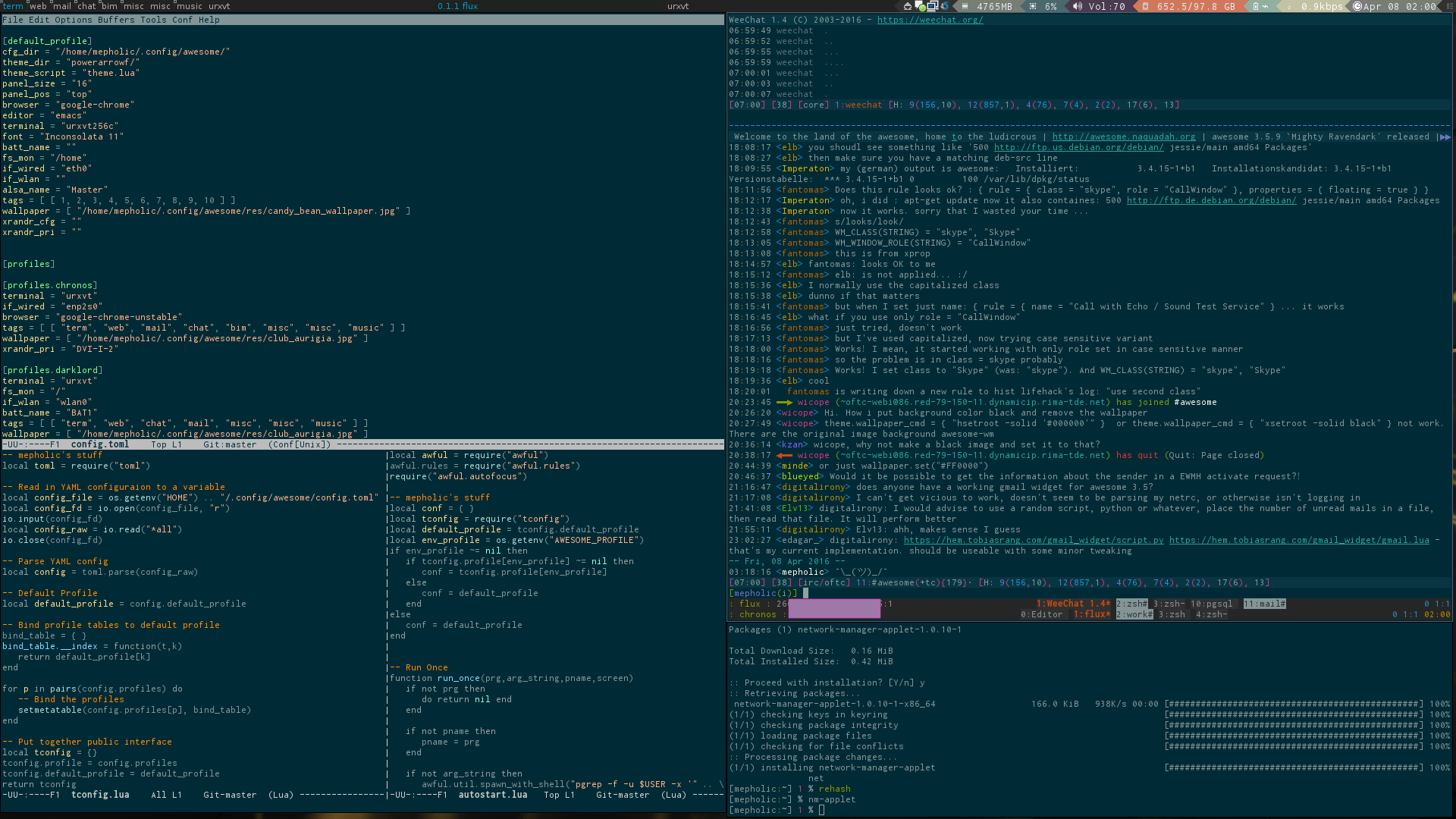awesome 3.5 powerbar theme with toml configuration
This is a modified version of esn89/powerarrow-dark. The configuration is provided by an awesome module called tconfig, written by mepholic.
Currently, tconfig allows configuration of multiple "profiles". The current profile can be changed by setting the AWESOME_PROFILE environment variable. tconfig has a default_profile, the settings of which are inherited by all other profiles. Any variable set explicitly in a profile will override the default profile; by not setting a variable in a profile, the variable will assume it's value from the default profile.
tconfig can be customized very easily due to it's simplicity as a module. I believe there are still uses to be discovered for it. I hope this project can be beneficial in many ways to the awesome community, so I'm putting this out here for everyone to use, contribute to, and share ideas!
The API is simple:
local tconfig = require("tconfig")
local default_profile = tconfig.default_profile
local other_profile = tconfig.profile.<name>default_profile is a table a variables defining the default configuration. Other profiles can be created, based on the default profile; any variable not set in a profile will be default.
In this example, we'll write a default config and two profiles to config.toml
[default_profile]
cfg_dir = "/home/user/.config/awesome/"
theme_dir = "powerarrowf/"
theme_script = "theme.lua"
panel_size = "16"
panel_pos = "top"
browser = "google-chrome"
editor = "emacs"
terminal = "urxvt256c"
font = "Inconsolata 11"
batt_name = ""
fs_mon = "/home"
if_wired = "eth0"
if_wlan = ""
alsa_name = "Master"
tags = [ [ 1, 2, 3, 4, 5, 6, 7, 8, 9, 10 ] ]
wallpaper = [ "/home/user/.config/awesome/res/default.jpg" ]
[profiles]
[profiles.yoda]
cfg_dir = "/home/yoda/.config/awesome/"
font = "Terminus 9"
if_wlan = "wlan0"
tags = [ [ 'web', 'term', 'work', 'misc' ], ['chat', 'mail', 'news', 'notes'] ]
wallpaper = [ "/home/yoda/.config/awesome/res/screen1.jpg", "/home/yoda/.config/awesome/res/screen2.jpg" ]
[profiles.luke]
cfg_dir = "/home/luke/.config/awesome/"
theme_dir = "dark-side/"
wallpaper = [ "/home/luke/.config/awesome/res/default.jpg" ]These pieces of configuration data are mapped into rc.lua in a very simple manner.
-- mepholic's stuff
local tconfig = require("tconfig")
local default_profile = tconfig.default_profile
local env_profile = os.getenv("AWESOME_PROFILE")
if env_profile ~= nil then
if tconfig.profile[env_profile] ~= nil then
conf = tconfig.profile[env_profile]
else
conf = default_profile
end
else
conf = default_profile
endAdding the above code near the top of any lua file that needs tconfig data should allow the file to use the current AWESOME_PROFILE, however this can be modified if necessary.
I run awesome on many different machines. Some of them I use slightly differently than others, so I have different tab names and layouts. I also use different wallpapers, and have other various different settings between different machines.
I wanted a way to simplify and unify the configurations, so I decided that templating parts of the awesome config in a markup language seemed like a reasonable idea.
I chose ToML as the markup language, because there was a readily available, seemingly-stable LUA module which makes for really simple dependancies. It also seems like a fairly reasonable choice for the job.
- If you have an existing awesome configuration directory at ~/.config/awesome, back it up and remove it
- Run the following command: git clone --recursive https://github.com/mepholic/awesome-tconfig.git ~/.config/awesome
- You may want to install some of the tools and programs ran in ~/.config/awesome/autostart.lua
- Configure ~/.config/awesome/config.toml to your liking.
- Export an appropriate AWESOME_PROFILE to environment. Usuaully ~/.xprofile or ~/.xsession, sometimes ~/.xinitrc
- (Optional) Remove ~/.config/awesome/vicious to use your system's local version of vicious.
- Restart awesome.
- Maintainer: mepholic
- Fork from: esn89/powerline-dark
Contact me on freenode, PM mepholic
MIT License
